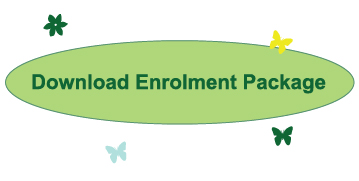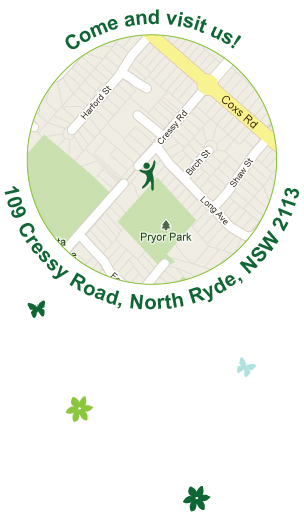A Typical Day at the Pre-school
8.30am to 12.00
The day begins for each child with a personal greeting at the door. The children shake hands with the Directress, say good morning and enter the classroom. Each child has a space for their bag and a spot to place fruit for their snack.
The children then choose the Montessori work they want to do. Each child is free to choose their own work from the materials and activities that they have been presented. They are able to work at each activity for as long as they desire. During this time they are also able to choose painting, creative construction or sand play. The environment of the classroom is especially prepared to meet the needs of the child at his or her appropriate level. The Directress introduces the child to the appropriate materials and observes his or her interaction within the environment.
 Most three year olds spend their time in the practical life and sensorial areas of the classroom. Practical life activities aim to give the child opportunities to develop skills for independence in his or her environment. Through doing exercises such as cleaning, buttoning, buckling, food preparation and other daily activities, the child develops hand eye coordination, fine motor skills, self discipline and the ability to complete a cycle of activity.
Most three year olds spend their time in the practical life and sensorial areas of the classroom. Practical life activities aim to give the child opportunities to develop skills for independence in his or her environment. Through doing exercises such as cleaning, buttoning, buckling, food preparation and other daily activities, the child develops hand eye coordination, fine motor skills, self discipline and the ability to complete a cycle of activity.
Sensorial activities are designed to encourage the child to order his or her perceptions. Through manipulating the materials the child has concrete experiences of concepts such as size, shape, colour, weight and smell etc,. The child develops the ability to classify, seriate and discriminate and learn language to describe these concepts.
When the child is ready they start work with the language and maths materials. The complete range of mathematics materials takes the child from an initial understanding of the meaning of numbers one to ten to a comprehension of the decimal system. The materials are designed to take the child from a concrete through to an abstract level of understanding of mathematical concepts.
 The language area involves exercises in oral language, reading and writing and increasing the child’s understanding of the function of words. Language development also occurs throughout the classroom in as many and as varied ways as possible. Cultural studies are interwoven into the classroom. Subjects in this area include geography, animal and plant classification, science experiments, social studies and studies of the environment.
The language area involves exercises in oral language, reading and writing and increasing the child’s understanding of the function of words. Language development also occurs throughout the classroom in as many and as varied ways as possible. Cultural studies are interwoven into the classroom. Subjects in this area include geography, animal and plant classification, science experiments, social studies and studies of the environment.
The children undertake various small group activities. There is a different one for each day of the week. These include music, art, cooking, projects, grace and courtesy, movement and storytelling.
All children have twenty minutes supervised outdoor play each day . There is a sandpit, climbing fort, slide and many gross motor activities set up.
The children meet together at the end of the session to say goodbye and reflect on their session before they are collected by their parents.
Home Environment is available from 12.00 to 5.30pm.
Where to from here
The Children’s House Montessori, located in North Ryde, prepares students for entry into primary schools across Sydney, including 24 different schools in just the last 3 years. The training and education provided at The Children’s House ensures the children are able to easily move to the primary school which best meets the needs of both the student and the family, whether it is one of the 15+ local public schools, six independent schools or one of the 2 Montessori schools. Students, depending on age and aptitude, can enter primary school at either the kindergarten or first class level, to maximize their learning potential.




